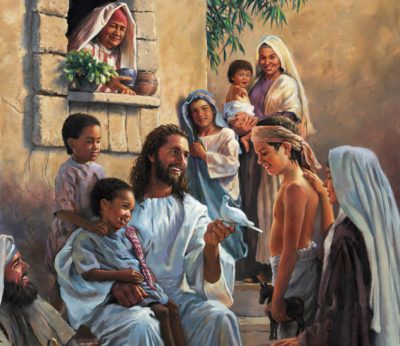Liturgical Readings for : Wednesday, 18th September, 2024
Wednesday of the Twenty-Fourth Week in Ordinary Time, Year 2
FIRST READING
A reading from the first letter of St Paul to the Corinthians 12:31-13:13
There are three things that last: faith, hope and love; and the greatest of these is love.
Be ambitious for the higher gifts. And I am going to show you a way that is better than any of them.

If I have all the eloquence of men or of angels, but speak without love,
I am simply a gong booming or a cymbal clashing.
If I have the gift of prophecy, understanding all the mysteries there are, and knowing everything, and if I have faith in all its fulness, to move mountains, but without love, then I am nothing at all.
If I give away all that I possess, piece by piece, and if I even let them take my body to burn it, but am without love,
it will do me no good whatever.
Love is always patient and kind; it is never jealous;
love is never boastful or conceited; it is never rude or selfish;
it does not take offence, and is not resentful.
Love takes no pleasure in other people’s sins but delights in the truth;
it is always ready to excuse, to trust, to hope, and to endure whatever comes.
Love does not come to an end.
But if there are gifts of prophecy, the time will come when they must fail; or the gift of languages, it will not continue for ever; and knowledge – for this, too, the time will come when it must fail. For our knowledge is imperfect and our prophesying is imperfect; but once perfection comes, all imperfect things will disappear.
When I was a child, I used to talk like a child, and think like a child, and argue like a child, but now I am a man, all childish ways are put behind me. Now we are seeing a dim reflection in a mirror; but then we shall be seeing face to face. The knowledge that I have now is imperfect; but then I shall know as fully as I am known.
In short, there are three things that last: faith, hope and love; and the greatest of these is love.
The Word of the Lord. Thanks be to God
Responsorial Psalm Ps 32
Response Happy the people the Lord has chosen as his own.
1. Give thanks to the Lord upon the harp, with a ten-stringed lute sing him songs.
a sing him a song that is new, , play loudly, with all your skill. Response
2. For the word of the Lord is faithful and all his works to be trusted.
The Lord loves justice and right and fills the earth with his love. Response
3. They are happy, whose God is the Lord, the people he has chosen as his own.
May your love be upon us, a Lord, as we place all our hope in you. Response
Gospel Acclamation 1 Thess 2: 13
Alleluia, alleluia!
Accept God’s message it for what it really is,
God’s message and not some human thinking.
Alleluia !
Or Jn 6:63
Alleluia, alleluia!
Your words are spirit and they are life:
you have the message of eternal life.
Alleluia !
GOSPEL
The Lord be with you And with your spirit.
A reading from the Gospel according to Luke 7:31-35 Glory to you, O Lord
A reading from the holy Gospel according to
“We played the pipes for you, and you wouldn’t dance; we sang dirges, and you wouldn’t cry”.

Jesus said to his disciples:
‘What description, then, can I find for the men of this generation?
What are they like? They are like children shouting to one another while they sit in the market place:
“We played the pipes for you, and you wouldn’t dance; we sang dirges, and you wouldn’t cry”.
‘For John the Baptist comes, not eating bread, not drinking wine, and you say, “He is possessed”.
The Son of Man comes, eating and drinking, and you say,
“Look, a glutton and a drunkard, a friend of tax collectors and sinners”.
Yet Wisdom has been proved right by all her children.’
The Gospel of the Lord. Praise to you, Lord Jesus Christ.
********************
Gospel Reflection Wednesday Twenty Fourth Week in Ordinary Time Luke 7:31-35
In today’s first reading, Paul declares, ‘When I was a child, I used to talk like a child, and think like a child, and argue like a child, but now I am a man, all childish ways are put behind me’. In the gospel reading, Jesus gives us a portrait of children talking and behaving as children. They are playing children’s games in the market place, imagining themselves to be playing the pipes at a celebratory event, like a wedding, and to be singing dirges, as at a funeral. Yet, some children simply don’t want to play; they are equally unmoved by the imaginary pipe playing and by the dirge singing. Jesus is reminded of how unmoved the people of his generation have been by the somewhat sombre ministry of John the Baptist and his own much more joyful ministry. They labelled John as ‘possessed’ and Jesus as a ‘glutton and a drunkard, a friend of tax collectors and sinners’.
In the first reading, Paul declared that love ‘does not take offence, and is not resentful’. Many of Jesus’ contemporaries took offence at both John and Jesus and resented their ministries. They lacked the quality of love towards John and Jesus that Paul describes in the first reading. This quality of love is a more than human love. It is what Paul calls elsewhere the fruit of the Spirit. It is the outward expression of God’s love that has been poured into our hearts through the Holy Spirit. If we open our hearts to the Spirit, we will see others with the eyes of love, recognizing their inalienable worth, rather than dismissing them with the kind of cheap labels that Jesus’ contemporaries used for himself and John the Baptist.
________________________________
The Scripture Readings are taken from The Jerusalem Bible, published 1966 by Darton, Longman & Todd Ltd.











